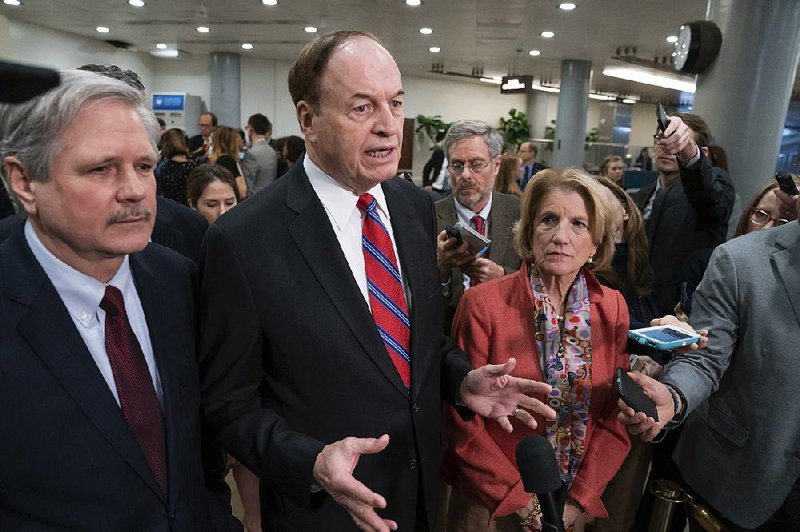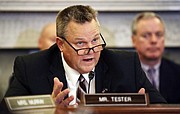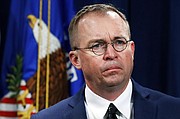WASHINGTON -- Congressional efforts to reach a border security deal broke down Sunday, which lawmakers and aides said put the nation at risk of another partial federal government shutdown at the end of the week.
Democrats are insisting on limiting the number of migrants who can be detained by the U.S. Immigration and Customs Enforcement agency, and that was the key issue in the impasse that developed over the weekend, according to officials in both parties. Republicans see the federal agency as an emblem of tough immigration policies, and Democrats have accused it of often going too far.
President Donald Trump's demands for a border wall were a secondary issue, the officials said.
The breakdown in talks made it unlikely that lawmakers will be able to finalize an agreement today, which would have given enough time for the deal to pass the House and Senate before the Friday night deadline set by the president.
"I think the talks are stalled right now," Senate Appropriations Committee Chairman Richard Shelby of Alabama, the lead Republican negotiator, said on Fox News Sunday. "I'm not confident we're going to get there."
Democratic negotiators held a conference call Sunday morning to discuss options, according to a Democratic aide, but they did not settle on a final decision on how to move forward. Another short-term spending bill could prevent a lapse in funding on Friday, though lawmakers have expressed reluctance at punting again on a final agreement.
Still, Shelby and Sen. Jon Tester, D-Mont. and a member of the negotiating committee, said Sunday that they had not given up.
Lawmakers on the 17-member conference committee had been trading offers over how much money could go to barriers along the U.S.-Mexico border, and were looking at between $1.3 billion and $2 billion for enhanced fencing or other barriers -- far short of the $5.7 billion and 200-plus miles of steel walls Trump had wanted.
Acting White House chief of staff Mick Mulvaney, in appearances on NBC's Meet the Press and Fox News Sunday, said "you absolutely cannot" eliminate the possibility of another shutdown if a deal is not reached over the wall and other border matters.
"You cannot take a shutdown off the table, and you cannot take $5.7 [billion] off the table," Mulvaney told NBC. "If you end up someplace in the middle, yeah, then what you probably see is the president say, 'Yeah, OK, and I'll go find the money someplace else.'"
The stalemate left the path forward to keeping the government open unclear.
The Department of Homeland Security, along with State, Agriculture, Commerce and a number of other federal agencies, are currently operating on a stopgap spending bill that Trump signed Jan. 25. Without some action by midnight Friday, those agencies will run out of money and begin to shut down again.
Another funding lapse could affect many Americans within days, because one of the agencies that would go unfunded during the shutdown is the IRS, which is processing tax returns for millions of people. During the 35-day shutdown that began in late December, thousands of IRS officials refused to show up for work without pay, backlogging the tax filing process.
The president referenced the disagreement in a tweet on Sunday.
"I don't think the Dems on the Border Committee are being allowed by their leaders to make a deal. They are offering very little money for the desperately needed Border Wall & now, out of the blue, want a cap on convicted violent felons to be held in detention!" the president wrote.
DETAINING MIGRANTS
Throughout the talks, Democrats had been focused on limiting Immigration and Customs Enforcement's ability to detain migrants, which has become a major issue for the party because of their opposition to the Trump administration's detention tactics.
Immigration and Customs Enforcement has regularly exceeded the current quota set by Congress on immigrant detention, which is 40,520 beds -- although that figure is treated generally as a floor, not a ceiling.
As of Sunday, a total of 48,747 people were in Immigration and Customs Enforcement custody, according to an agency official.
The Democrats' proposal included a new limit on detention beds for immigrants picked up not at the border, but in the interior of the country. Democrats wanted to cap that number at 16,500 people, which they said is around the level of interior detentions in the final years of President Barack Obama's administration.
Republicans want to exclude a range of migrants from the cap, including people convicted of or charged with a variety of crimes, ranging from violent felonies to misdemeanor drug offenses.
Democrats said that would make the cap meaningless because Immigration and Customs Enforcement, popularly called ICE, could hold thousands of people without criminal records, in addition to an unlimited number of people who may only have been charged with misdemeanors.
Rep. Lucille Roybal-Allard, D-Calif., a member of the conference committee, defended the Democratic position on bed space.
"A cap on ICE detention beds will force the Trump administration to prioritize deportation for criminals and people who pose real security threats, not law-abiding immigrants who are contributing to our country," Roybal-Allard said in a statement.
Democrats, newly in control of the House, have faced pressure from some liberals in their ranks to draw a much harder line in their negotiations over the border. Liberals including Rep. Alexandria Ocasio-Cortez, D-N.Y., have proposed entirely cutting funding to Immigration and Customs Enforcement.
Republicans quickly seized on the new dispute over detention beds to lump all Democrats in with the most liberal elements in the party.
"Now, apparently, not only is it enough they want to abolish ICE. They want to abolish the bed spaces available to the country to house violent offenders, so they can be held and deported," Sen. Lindsey Graham, R-S.C., said on Fox News Channel. "I promise you this. Donald Trump is not going to sign any bill that reduces the number of bed spaces available to hold violent offenders who come across our border. He can't do that. He won't do that, and you can take that to the bank."
Even though there is less than one week left to complete a deal, negotiators still have time to work something out, and they note that deadlines often force legislators to compromise.
"There are bumps in the road, but as long as we stay focused in a bipartisan way, bicameral way, to get this done, I'm hopeful we can get it done," Tester said on Fox News Sunday. "Is it a done deal? No it isn't, and we could end up in a train wreck, it's happened before. But I don't think anybody has an appetite for a government shutdown, and I think everybody wants to make sure our borders are secure."
Lawmakers held out the possibility that Trump could find some way to fortify border security and build some structures without resorting to a precedent-setting emergency declaration. Mulvaney said the president had asked him to "comb through the law" and "go find money in any place we could" to fully fund a wall.
"There's pots of money where presidents, all presidents, have access to without a national emergency," Mulvaney said on NBC.
Information for this article was contributed by Erica Werner, Damian Paletta, Seung Min Kim and Felicia Sonmez of The Washington Post; Jonathan Lemire, Alan Fram, Hope Yen, Andrew Taylor, Lisa Mascaro and Julie Walker of The Associated Press; and by Emily Cochrane, Maggie Haberman and Eric Schmitt of The New York Times.
A Section on 02/11/2019



